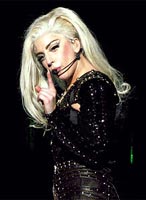
Top stories






More news


Marketing & Media
Ads are coming to AI. Does that really have to be such a bad thing?














Previous accepted practice at such events has been for accredited news photographers to be allowed to take pictures during the first three songs and then to withdraw. On Wednesday, 28 November, the organisers confirmed to Sanef members, seeking accreditation, that no news photography would be allowed at all.
This appears to be the first time that such a ban has been imposed and Sanef will be seeking an urgent meeting with the organisers to explain the negative implications of their move for media freedom. Sanef will request them to reconsider the matter and to restore normal coverage facilities to news photographers seeking accreditation.
When reporters and photographers are invited to cover such concerts and other public events, they conduct themselves as independent observers and their reports and photographs are published on the basis that they were not subject to censorship or other interference.
While it is clear that the Lady Gaga tour is just another commercial venture, recent controversy in South Africa regarding a number of religious and other organisations which have protested vigorously against even her presence in the country, makes her visit a matter of public interest and not just "of interest" to her fans.
Lady Gaga's freedom to visit South Africa and to perform, regardless of any offence she may cause to those opposed to her shows, is protected by the freedom of speech provisions in the constitution.
Sanef states that the very least she and her entourage should do is to carry through that freedom of access to information from her side too.
Sanef is concerned at what appears to be a growing trend by commercial event organisers to try to impose censorship or restrictions on the media other than the few that the media accepts are necessary for the successful conduct of the proceedings.
The only way in which the public can trust media coverage of such events is when journalists and photographers can operate freely and independently and the public is aware of this.
A ban on photographers or interference with journalists would immediately raise public suspicions about the integrity of reports of such events. Should this occur not only will the press be harmed but also the attraction of the event.